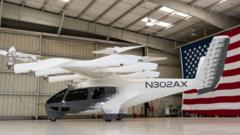The LA28 committee's partnership with Archer Aviation could change how fans navigate the city during the games.
**Air Taxis Set to Revolutionize Travel at the LA 2028 Olympics**

**Air Taxis Set to Revolutionize Travel at the LA 2028 Olympics**
Plans for a revolutionary air taxi service aim to alleviate traffic for Olympic spectators in Los Angeles.
With the 2028 Olympics fast approaching, LA28 has unveiled ambitious plans to include an air taxi service, in collaboration with Archer Aviation, aimed at carrying spectators above Los Angeles’ infamous traffic snarls. This initiative promises to provide quick aerial transport to and from major event venues, creating an innovative travel experience for both residents and visitors.
Flying taxis have long been envisioned but have struggled to find their way into reality. The Paris 2024 Olympics marked an attempt to roll out such services, but certification delays thwarted those plans. Despite Archer Aviation also facing certification challenges with the Federal Aviation Administration (FAA) in the United States, its leadership remains hopeful of obtaining the required Type Certification this year.
Once certified, the air taxis would be capable of providing flights of 10 to 20 minutes, connecting key locations across the Los Angeles area. Though the pricing structure is still undecided, Archer Aviation intends to set fares comparable to a premium ridesharing service, using an app for customer requests. Each air taxi can accommodate up to four passengers and operates with helicopter-like takeoff and landing capabilities.
The air taxis will utilize the Midnight aircraft, a member of the electric vertical take-off and landing (eVTOL) category. Supported by major corporations like Boeing and United Airlines, Archer Aviation aims to transform urban transport. The Midnight design, featuring twelve engines and offering reduced noise and emissions compared to traditional aircraft, shows promise for safer and more efficient urban air mobility.
Despite challenges including safety regulations and investment hurdles facing the flying taxi industry, Archer remains optimistic about its prospects, especially with the upcoming Olympics serving as a platform for innovation. The UK has set ambitious goals for flying taxis, forecasting their debut by 2026, and many see similar potential within the United States.
The Los Angeles Olympics, marking the city’s third time hosting the Summer Games, has also declared restrictions on conventional vehicles, reinforcing the need for alternative transport solutions against a backdrop of previously shelved transit expansion plans. The incorporation of air taxis during LA28 could redefine both local transit and the future of urban travel in America.
Flying taxis have long been envisioned but have struggled to find their way into reality. The Paris 2024 Olympics marked an attempt to roll out such services, but certification delays thwarted those plans. Despite Archer Aviation also facing certification challenges with the Federal Aviation Administration (FAA) in the United States, its leadership remains hopeful of obtaining the required Type Certification this year.
Once certified, the air taxis would be capable of providing flights of 10 to 20 minutes, connecting key locations across the Los Angeles area. Though the pricing structure is still undecided, Archer Aviation intends to set fares comparable to a premium ridesharing service, using an app for customer requests. Each air taxi can accommodate up to four passengers and operates with helicopter-like takeoff and landing capabilities.
The air taxis will utilize the Midnight aircraft, a member of the electric vertical take-off and landing (eVTOL) category. Supported by major corporations like Boeing and United Airlines, Archer Aviation aims to transform urban transport. The Midnight design, featuring twelve engines and offering reduced noise and emissions compared to traditional aircraft, shows promise for safer and more efficient urban air mobility.
Despite challenges including safety regulations and investment hurdles facing the flying taxi industry, Archer remains optimistic about its prospects, especially with the upcoming Olympics serving as a platform for innovation. The UK has set ambitious goals for flying taxis, forecasting their debut by 2026, and many see similar potential within the United States.
The Los Angeles Olympics, marking the city’s third time hosting the Summer Games, has also declared restrictions on conventional vehicles, reinforcing the need for alternative transport solutions against a backdrop of previously shelved transit expansion plans. The incorporation of air taxis during LA28 could redefine both local transit and the future of urban travel in America.




















